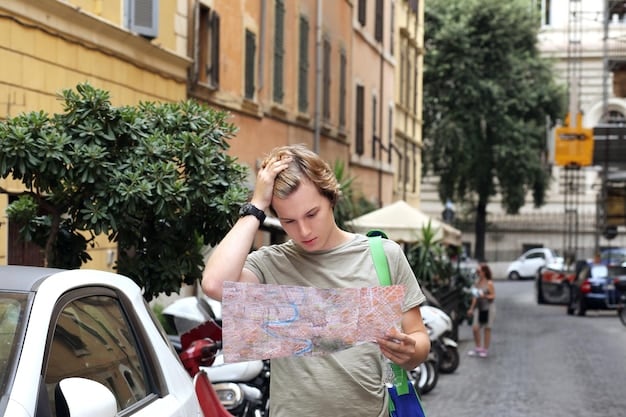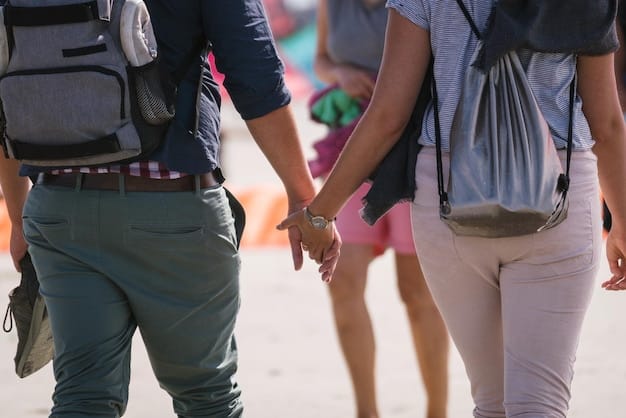Avoid Tourist Traps: Stay Safe from Scams Abroad in 2025

Avoid these 3 common scams targeting US tourists abroad in 2025 by staying vigilant against pickpocketing in crowded areas, refusing unsolicited offers, and verifying taxi fares upfront to ensure a safe and enjoyable travel experience.
Planning your dream international vacation? While the excitement of exploring new cultures is thrilling, it’s crucial to **avoid these 3 common scams targeting US tourists abroad in 2025**. Let’s dive into how you can stay safe and informed during your travels.
Be Aware of Pickpocketing Tactics
Pickpocketing remains one of the most prevalent scams targeting tourists worldwide. Understanding their tactics can help you avoid becoming a victim.
Common Pickpocketing Techniques
Pickpockets often operate in crowded areas, using distraction techniques to steal your belongings unnoticed. Be extra cautious in popular tourist spots.
- The Bump and Grab: A pickpocket intentionally bumps into you, using the momentary distraction to snatch your wallet or phone.
- The Friendly Helper: Someone offers to help you with your luggage or directions, only to disappear with your belongings.
- The Distraction Duo: One person creates a distraction, while the other swiftly picks your pocket.

Protecting yourself from pickpocketing requires vigilance and proactive measures. Keep your valuables secure and be aware of your surroundings.
- Use Anti-Theft Bags: Invest in bags with hidden compartments, slash-proof straps, and RFID-blocking technology.
- Keep Valuables Hidden: Store your wallet, phone, and passport in a front pocket or a hidden money belt.
- Be Aware of Your Surroundings: Pay attention to people around you and be wary of anyone acting suspiciously.
By staying informed and taking precautions, you can significantly reduce your risk of falling victim to pickpockets. Remember, awareness is your best defense.
Recognize and Refuse Unsolicited Offers
Unsolicited offers often seem too good to be true, and that’s usually because they are. Be wary of any offers that come out of the blue, especially if they involve money or personal information.
Common Types of Unsolicited Offers
From fake charity requests to staged tourist surveys, unsolicited offers can take many forms. Recognizing them is the first step in protecting yourself.
- Fake Charity Requests: Scammers pose as charity workers, asking for donations for nonexistent causes.
- Staged Tourist Surveys: You’re approached to complete a “survey” that’s actually a ploy to get your personal information.
- Free Gifts with a Catch: You’re offered a free gift, but you have to attend a sales presentation or provide your credit card details.
Knowing how to respond to unsolicited offers can save you from potential scams. Politely decline and avoid engaging in conversation.
- Politely Decline: Simply say “no, thank you” and walk away.
- Avoid Eye Contact: Don’t make eye contact, as this can be seen as an invitation to engage.
- Trust Your Instincts: If something feels off, it probably is. Trust your gut and remove yourself from the situation.

By being cautious and refusing unsolicited offers, you can protect yourself from scams and enjoy a safer travel experience. Remember, it’s okay to say no.
Verify Taxi Fares and Avoid Overcharging
Taxi scams are a common issue for tourists, especially in unfamiliar cities. Verifying fares and using reputable taxi services can help you avoid being overcharged.
How Taxi Scams Work
Taxi drivers may use various tactics to inflate fares, including rigged meters, long routes, and excessive surcharges. Always be aware of the standard rates.
- Rigged Meters: The meter runs faster than it should, significantly increasing the fare.
- Long Routes: The driver takes a longer, less direct route to increase the distance and the fare.
- Excessive Surcharges: Additional fees are added without justification, such as “tourist tax” or “night surcharge.”
Taking proactive steps can prevent taxi scams. Always agree on a fare beforehand or use a ride-hailing app with transparent pricing.
- Agree on a Fare: Before getting into the taxi, negotiate a fixed fare to your destination.
- Use Ride-Hailing Apps: Apps like Uber and Lyft provide transparent pricing and track the route.
- Check the Meter: Ensure the meter is running and that the rate is reasonable for the distance.
By verifying taxi fares and avoiding overcharging, you can save money and have a more pleasant travel experience. Don’t hesitate to question unusual charges.
Research Local Laws and Customs to Stay Out of Trouble
Navigating foreign laws and customs can be tricky but understanding the local rules is essential for a safe and respectful trip. Research potential red flags to avoid conflicts.
Common Misunderstandings
Some countries have vastly different laws than the US. What’s acceptable at home could land you in hot water.
- Photography Restrictions: Taking pictures of government buildings or certain religious sites can be prohibited.
- Public Behavior: Public intoxication, loud music, or displays of affection might be frowned upon.
- Drug Laws: Penalties for drug possession can be severe, even for small amounts.
Arming yourself with knowledge of local laws and customs empowers you to navigate situations confidently and stay out of legal or social trouble.
- Research Before Traveling: Websites and travel guides offer detailed information on local laws, customs, and etiquette.
- Respect Local Customs: Observe and learn from the locals; dress modestly and avoid behaviors that might be offensive.
- Follow Official Guidelines: Heed signs and warnings posted in public areas, especially regarding restricted activities.
Staying informed ensures you enjoy your trip while respecting local norms and upholding the law.
Secure Your Accommodation with Verifiable Booking Platforms
The promise of the perfect hotel stay can quickly turn into a nightmare if you book your accommodation via unverified or untrustworthy platforms. Protect your trip and your funds.
Booking Scams: A Cautionary Tale
Fraudulent listings and fake rental agencies have become alarming issues, potentially leaving you without a place to stay.
- Phishing Emails: Scammers send emails appearing to be from legitimate booking sites, asking for your payment details.
- Fake Listings: Fraudsters list properties they don’t own on popular sites, pocketing the deposit.
- Hidden Fees: Additional charges are added at the last minute, inflating the total cost significantly.
Only book with reputed, secure sites or hotel chains to ensure the legitimacy of your reservation and security of your payment data.
- Use Trusted Platforms: Stick to well-known booking sites with secure payment systems.
- Read Reviews: Check reviews from other travelers to gauge the quality and credibility of the accommodation.
- Confirm Directly with the Hotel: Call the hotel after booking to verify your reservation.
By proceeding cautiously and confirming every detail, you ensure a safe and comfortable stay.
Keep Copies of Essential Travel Documents
Few things are as disruptive as lost or stolen travel papers in a foreign land. Keeping copies of important documents can mitigate the disaster and speed up replacements.
The Importance of Backup
Accidents happen. Losing your passport, visa, or driver’s license can severely curtail your exploration.
- Identification: Without valid identification, it might be challenging to prove citizenship or access certain services.
- Travel Plans: Copies of airline tickets and hotel reservations help in case of any disputes or scheduling issues.
- Emergency Contacts: Having phone numbers and addresses for important contacts simplifies reaching out for help.
Photocopy all vital documents, store them separately from originals, and keep digital versions in secure cloud storage.
- Photocopies: Keep physical copies in multiple places, such as your suitcase and daypack.
- Digital Copies: Scan or photograph documents and store them in a secure cloud drive, accessible via multiple devices.
- Share with Family: Email copies to a trusted family member, ensuring peace of mind should access become an issue.
Preparing strategically ensures you’re never totally stranded, even if the worst seems to occur.
| Key Point | Brief Description |
|---|---|
| 🚨 Pickpocketing | Be aware in crowded areas; use anti-theft bags and keep valuables hidden. |
| 🚫 Unsolicited Offers | Politely decline; avoid eye contact and trust your instincts. |
| 🚕 Taxi Scams | Agree on fare beforehand; use ride-hailing apps; check the meter. |
| 📑 Travel Documents | Keep copies of passport, tickets, and IDs in both physical and digital formats. |
FAQ
▼
Pickpocketing commonly occurs in crowded tourist attractions, public transportation hubs, and busy marketplaces. Be extra vigilant in these high-traffic areas.
▼
Look for official documentation and cross-reference the charity’s details online. Legitimate organizations readily provide this information.
▼
Politely but firmly refuse to pay the inflated fare and note the taxi number. Report the incident to local authorities or the taxi company.
▼
Yes, knowing basic phrases can help you communicate better, avoid misunderstandings, and show respect for the local culture.
▼
Travel insurance is crucial to cover unexpected medical expenses, trip cancellations, lost luggage, and other travel-related emergencies, offering peace of mind.
Conclusion
Staying informed and proactive is key to a safe and scam-free travel experience. By being aware of common scams, taking precautions, and respecting local customs, US tourists can confidently explore the world and create lasting memories without falling victim to fraudulent schemes.





